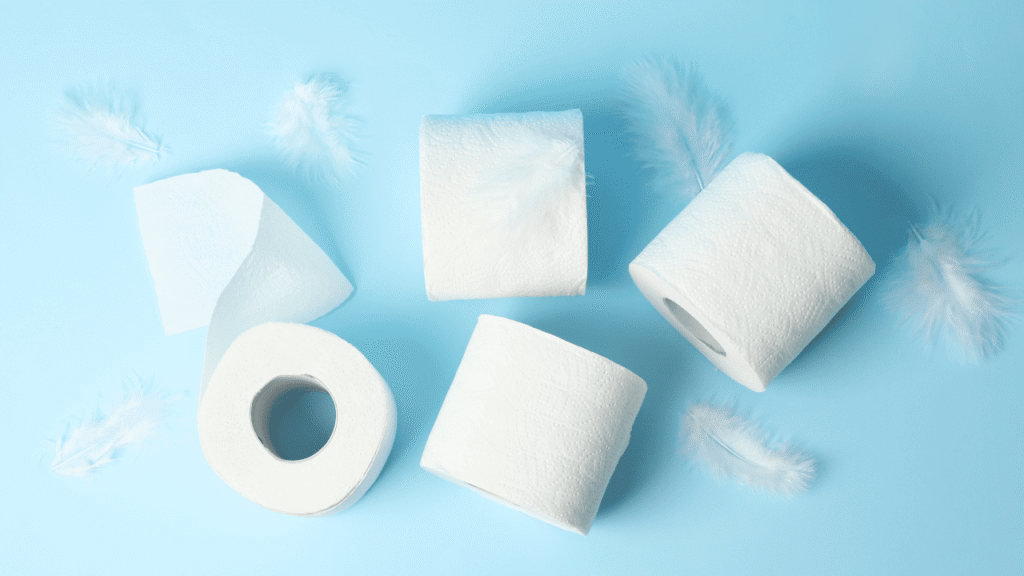What to Eat in Loose Motions (5 Foods and 2 Drinks)

Dr. Tehmasip Ali
26th May, 2025
⏱︎ 7 min read

When struggling with loose motions, the BRAT diet (Banana, rice, applesauce, and toast) and foods rich in probiotics, healing carbohydrates, electrolytes, and protein can be helpful. They provide quick energy while being easy on the digestive system. However, avoid dairy products, fatty, fried, and high-fiber foods like beans or French fries.
But if this doesn’t give a really good answer to your real question — “What to eat in loose motions?”
You probably want a detailed list of actual foods you can eat when struggling with loose motions.
If that's the case, keep reading...
You're about to get 20+ doctors-recommended food options that can calm your gut-health and stop the chaos.
Keep Reading to Find:
5 Best Foods to Eat During Loose Motions
1: Binding Foods
Binding foods contain soluble fiber and pectin that absorb excess water in the intestines, helping firm up stools. A 2021 study in Digestive Diseases and Sciences showed pectin-rich foods reduced stool frequency by 45% within 24 hours.
Best foods for loose motion in this category:
- Ripe bananas: High in pectin and potassium (replaces lost electrolytes)
- White rice: Easy to digest, contains binding starches
- Applesauce: Pectin-rich without the fiber of whole apples
- White toast: Simple carbohydrates that bind stools
- Oatmeal: Soluble fiber that absorbs intestinal fluid
- Boiled potatoes: Starch content helps solidify stools
Dr. Tehmasip’s recommendation:
“I tell my patients to eat one ripe banana every 3-4 hours. The combination of pectin and potassium makes it the perfect food to stop loose motions naturally. Choose yellow bananas with small brown spots – they have the highest pectin content.”
2. Probiotic Foods
Probiotics restore beneficial bacteria decimated during loose motions. Research from the American Journal of Clinical Nutrition (2022) found that probiotic foods reduced the duration of symptoms by 30%.
Best probiotic foods during loose motions:
- Plain yogurt: Choose low-fat varieties with live cultures
- Kefir: Higher probiotic count than yogurt
- Miso soup: Gentle on the stomach with beneficial bacteria
- Buttermilk: Traditional remedy with natural probiotics
- Aged cheese: Small amounts provide probiotics
- Kombucha: Diluted versions for sensitive stomachs
Dr. Tehmasip’s recommendation:
“Start with 2 tablespoons of plain yogurt after 24 hours of symptoms. If well-tolerated, increase to ½ cup twice daily. The live cultures help restore your gut microbiome faster than any supplement.”
3: Electrolyte-Rich Foods
Studies show electrolyte balance is crucial for stopping loose motions effectively.
Best electrolyte foods for loose motions:
- Coconut water: A Natural source of potassium and sodium
- Bone broth: Contains sodium, potassium, and healing compounds
- Watermelon: High water content with natural electrolytes
- Cucumber: Hydrating with minerals
- Sports drinks: Diluted 50/50 with water
- Pedialyte: Medical-grade electrolyte solution
Dr. Tehmasip’s recommendation:
“Coconut water is my go-to recommendation. It’s nature’s sports drink – perfectly balanced electrolytes without artificial ingredients. Drink 250ml every 2 hours during active symptoms.”
4: Protein Sources
Easy-to-digest proteins support healing without stressing the digestive system. The Journal of Nutrition (2023) found that adequate protein intake reduced recovery time by 25%.
Best protein sources for loose motions:
- Boiled eggs: Complete protein, easy to digest
- Chicken breast: Lean, minimal fat content
- Fish (steamed): Omega-3s reduce inflammation
- Tofu: Plant-based, gentle option
- Bone broth: Liquid protein with healing properties
- Greek yogurt: High protein with probiotics
Dr. Tehmasip’s recommendation:
“Once you can tolerate solids, start with one boiled egg. The albumin in egg whites is incredibly gentle and provides essential amino acids for gut repair. Avoid fried or scrambled preparations initially.”
5: Healing Carbohydrates
Simple carbohydrates provide quick energy while being easy on the digestive system. They help maintain blood sugar levels depleted during loose motions.
Best carbohydrate choices:
- White rice porridge: Maximum digestibility
- Cream of wheat: Smooth texture, binding properties
- Rice cakes: Light, easy to digest
- Saltine crackers: Sodium content helps retention
- White pasta: Well-cooked, minimal fiber
- Instant oatmeal: Quick-cooking, less fiber
Dr. Tehmasip’s recommendation:
“Rice porridge is my top choice – cook 1 cup rice in 6 cups water until mushy. It’s incredibly soothing and provides sustained energy. Add a pinch of salt for electrolyte replacement.”
Looking for a General Physician in Lahore?
At AHMC, we provide you with one of the top MBBS general physicians in the city.

2 Best Drinks During Loose Motions
The best drinks to stop loose motions are Electrolyte solutions and Herbal Teas. Since they both help with hydration while providing essential anti-inflammatory compounds, they’re considered one of the best drinks during loose motions.
Here’s a detailed breakdown:
1: Electrolyte Solutions
Electrolyte solutions replace exact minerals lost during loose motions.
Specific examples:
- ORS packets: WHO-formulated, perfectly balanced
- Homemade ORS: 6 tsp sugar + ½ tsp salt per liter
- Pedialyte: Medical-grade, flavored options
- Gastrolyte: Pharmaceutical preparation
- Coconut water: Natural alternative with potassium
Dr. Tehmasip’s advice:
“Don’t wait until you feel thirsty. Sip ORS continuously – 2-3 liters daily during active symptoms. The sugar-salt ratio is crucial for absorption, so follow mixing instructions exactly.”
2: Herbal Teas
Herbal teas provide hydration while delivering anti-inflammatory compounds.
Specific examples:
- Chamomile tea: Antispasmodic properties
- Ginger tea: Reduces nausea and inflammation
- Peppermint tea: Soothes the digestive tract
- Fennel tea: Reduces gas and cramping
- Black tea: Tannins help bind stools
Dr. Tehmasip’s advice:
“Ginger tea is particularly effective – steep fresh ginger for 10 minutes. The gingerol compounds reduce inflammation throughout the digestive tract. Drink warm, not hot, to avoid irritation.”
Loving the Blog So Far?
We post daily health tips like this on our Instagram. Make sure you don't miss them out!
Food to Avoid During Loose Motions
1. Dairy Products
Why?
Dairy can irritate the digestive system and worsen diarrhea, as it can be difficult to digest during stomach upset.
Examples:
Milk, cheese, ice cream, cream, and yogurt.
2. Fatty and Fried Foods
Why?
These foods are harder to digest and can lead to further irritation of the gut, prolonging symptoms.
Examples:
French fries, fried chicken, potato chips, and greasy fast food.
3. High-Fiber Foods
Why?
Fiber-rich foods can be too harsh on an already sensitive stomach, potentially increasing the frequency of bowel movements.
Examples:
Whole grains, beans, lentils, raw vegetables, and cruciferous vegetables (broccoli, cauliflower).
4. Spicy Foods
Why?
Spices can irritate the stomach lining and trigger more frequent bowel movements.
Examples:
Hot peppers, spicy curries, and spicy sauces.
5. Sugary and Artificially Sweetened Foods
Why?
Sugar and artificial sweeteners can draw water into the intestines, leading to more diarrhea.
Examples:
Sweets, soda, energy drinks, and sugar-free gum.
When to See a Doctor for Loose Motions?
While most loose motion cases resolve just by the dietary changes mentioned above, certain symptoms require immediate medical attention.
See a doctor if:
- Blood in stools
- High fever (above 102°F)
- Severe dehydration signs (dizziness, dry mouth)
- Symptoms lasting over 3 days
- Severe abdominal pain
- Signs of shock (rapid heartbeat, confusion)
Final Thoughts for You:
Remember, everyone’s body responds differently, so listen to your own cues.
See how your body reacts to each dietary change and then adjust accordingly.
With the right approach, you’ll not only manage loose motions effectively but also speed up your recovery process.
Stay hydrated, nourish your gut, and take care of your health—your body will thank you for it!
But Remember,
If your loose motions persist or worsen (like blood in the stool), don’t wait to see a general physician.
FAQs
Q: Can we drink lassi during loose motion?
Yes, but only plain, unsweetened lassi in moderation.
Lassi made from curd can help restore gut bacteria and aid rehydration, but added sugars or flavors can worsen symptoms.
Q: Can I eat an egg during loose motion?
Yes, you can eat boiled eggs.
Plain, boiled eggs are easy to digest and provide protein without aggravating symptoms.
Q: What is the best loose motion medicine?
ORS and Loperamide (Imodium) are commonly used.
ORS restores fluids and electrolytes, while Loperamide slows down bowel movements—consult a doctor before use.
Q: How do I professionally say I am having loose motion?
Say: “I’m experiencing an upset stomach or diarrhea.”
This sounds polite and appropriate in both professional and medical settings.
Q: Can we have coffee when suffering from loose motion?
No, avoid coffee during loose motions.
Caffeine is a gut stimulant and can worsen dehydration and bowel urgency.


Contact Now:

0309-9339981
© 2025. All rights reserved.
© 2025. All rights reserved.
